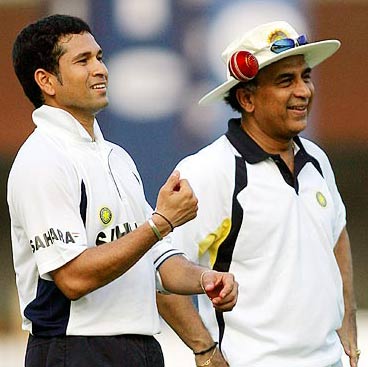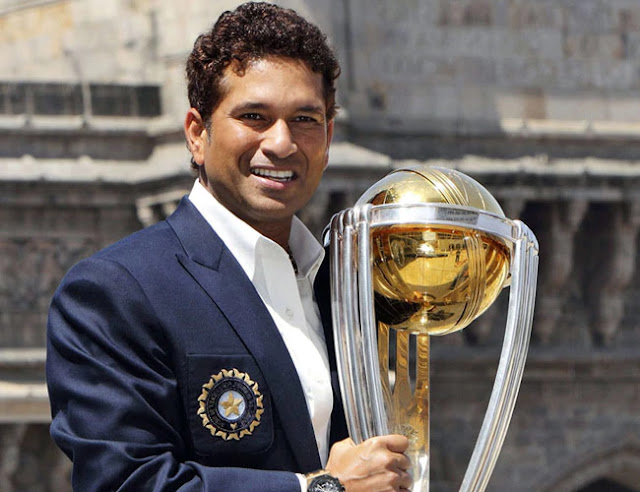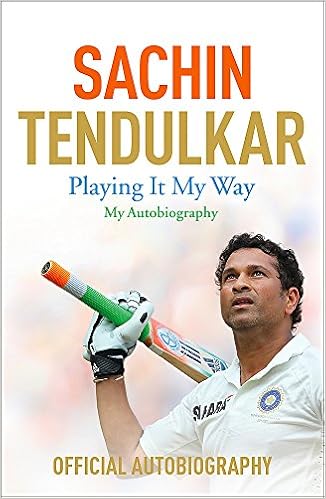Tendulkar was born on 24 April 1973 into a Rajapur Saraswat Brahmin family in Bombay. He made an impact in cricket from a very early age, displaying a prodigious talent. By the age of 15, he had made his first-class debut. He made his test debut against Pakistan, aged only 16.
Sachin Tendulkar has played a key role in Indian test cricket ever since his debut at an early age in 1992. A child cricket prodigy who has lived up to his early promise. He is one of the most decorated players in the history of cricket. After his retirement from the game in 2013, he was awarded Bharat Ratna, India’s highest civilian award – the youngest person to receive this award.
Tendulkar is the only player to score over 30,000 runs in international cricket. He scored a total of 34,357 runs in 664 international cricket matches. He is also the only player to score one hundred international hundreds and the first player to score a double hundred in limited overs cricket.
He has played many flawless innings and led India to many notable victories, not least over arch rivals and the number one test side – Australia in 2008. Standing only 5 ft 5 in (1.65 m) Tendulkar has often been called ‘The Little master’ – or even God of Cricket. He has a wonderful technique and can score runs with great fluency and style. He has minimal movement and can play a wide range of shots.
Sometimes Tendulkar has been criticised for making runs against easy opposition and not rising to the big occasion. But, that criticism is not entirely fair and Tendulkar has recently made some key hundreds in the most testing of situations.
Sachin Tendulkar was the first non-Yorkshireman born player to play for the county. It was a key moment for Yorkshire CC. Unfortunately, it was not an unreserved success as his dominant form deserted him.
 He was also the first player to pass 10,000 runs in limited overs cricket. At the start of 2013, he had accumulated a record 18,000 ODI runs, giving him over 34,000 runs at international level – a record that could stand for a long time.
He was also the first player to pass 10,000 runs in limited overs cricket. At the start of 2013, he had accumulated a record 18,000 ODI runs, giving him over 34,000 runs at international level – a record that could stand for a long time.
In India, Sachin Tendulkar is one of the most famous persons in the country. He receives a tremendous amount of adulation and attention. He is admired not just for his cricket, but his image of being a good son of India. He has a modest approach to life, being a quiet family man, and he still visits Indian temples. He is a devotee of the Hindu Guru, Sathya Sai Baba of Puttaparthi. Tendulkar is widely seen as a great role model.
Citation: Pettinger, Tejvan. “Biography of Sachin Tendulkar”, Oxford, UK. www.biographyonline.net, Published 12th Jan. 2010. Last updated 20 February 2018.
Sachin Tendulkar – autobiography
Sachin Tendulkar autobiography at Amazon
Related Cricketers
- Donald Bradman
- Sir Gary Sobers
- Imran Khan
- Sachin Tendulkar
- Freddie Flintoff
- Monty Panesar
- Geoff Boycott
- Ian Botham
- List of Cricketers
Early Years
Largely considered cricket's greatest batsman, Sachin Tendulkar was born April 24, 1973, in Bombay, India, to a middle-class family, the youngest of four children. His father was a writer and a professor, while his mother worked for a life insurance company.
Named after his family's favorite music director, Sachin Dev Burman, Tendulkar wasn't a particularly gifted student, but he'd always shown himself to be a standout athlete. He was 11 years old when he was given his first cricket bat, and his talent in the sport was immediately apparent. At the age of 14, he scored 326 out of a world-record stand of 664 in a school match. As his accomplishments grew, he became a sort of cult figure among Bombay schoolboys.
After high school, Tendulkar enrolled at Kirti College, where his father also taught. The fact that he decided to go to the school where his father worked came as no surprise. Tendulkar's family is very close, and years after he'd achieved stardom and cricket fame, he continued to live next door to his parents.
Cricket Superstar
Wasting little time living up to the lofty expectations, the 15-year-old Tendulkar scored a century in his domestic first-class debut for Bombay in December 1988, making him the youngest player to do so. Eleven months later, he made his international debut for India against Pakistan, where he famously declined medical assistance despite getting hit in the face by Waqar Younis.
In August 1990, the 17-year-old delivered a match-saving 119 not out against England to become the second-youngest player to record a century in Test play. Other celebrated early highlights included a pair of centuries in Australia in 1992, one of them coming at the blindingly fast WACA track in Perth. Underscoring his rapid rise to the top of his sport, Tendulkar in 1992 became the first international player to sign with England's storied Yorkshire club.
In India, Tendulkar's star shined even brighter. In a country reeling from troubled economic times, the young cricketer was seen as a symbol of hope by his countrymen that better times lay ahead. One national newsweekly went so far as to devote an entire issue to the young cricketer, dubbing him "The Last Hero" for his home country. His style of play—aggressive and inventive—resonated with the sport's fans, as did Tendulkar's unassuming off-the-field living. Even with his increasing wealth, Tendulkar showed humility and refused to flaunt his money.
After finishing the 1996 World Cup as the event's leading scorer, Tendulkar was named captain of the Indian national team. However, his tenure marked one of the few blights on an otherwise illustrious career. He was relieved of the responsibility in January 1998, and briefly took over as captain again in 1999, but overall won just four of 25 Test matches in that position.
Continued Success
His struggles with the captaincy notwithstanding, Tendulkar remained as brilliant as ever on the field. He delivered perhaps his finest season in 1998, devastating Australia with both his maiden first-class double century and his memorable "desert storm" performance in Sharjah. In 2001, Tendulkar became the first player to score 10,000 runs in One Day International (ODI) competition, and the following year he surpassed the great Don Bradman on the all-time list with his 30th Test century. He was again the leading scorer during World Cup play in 2003, earning Man of the Series honors despite India's loss to Australia in the final.
Tendulkar's dominance of his sport continued even as he moved into his 30s. He delivered an unbeaten 241 against Australia in January 2004, and notched his record-breaking 35th century in Test competition in December 2005. In October 2008, he entered the record books again by blowing past Brian Lara's mark of 11,953 Test runs. On the heels of becoming the first player to post a double century in ODI play, he was named the 2010 International Cricket Council Cricketer of the Year.
In April 2011, Tendulkar chalked up another milestone when he and his team propelled India to a World Cup victory over Sri Lanka, the first in his long career. During the tournament, he again demonstrated he was in a class by himself by becoming the first batsman to score 2,000 runs and six centuries in World Cup play.
His career nearing the finish line, Tendulkar was sworn in as a Rajya Sabha member at the Parliament House in New Delhi in June 2012. He retired from ODI competition in December, and the following October, the legendary batsman announced he was calling it quits in all formats. Tendulkar played his 200th and final Test match in November 2013, finishing with a jaw-dropping accumulation of statistics that included more than 34,000 runs and 100 centuries in international play.
Post-Playing Career
Shortly after his final match, Tendulkar became the youngest person and the first sportsman to be conferred the Bharat Ratna, India's highest civilian honor.
Revered throughout his home country, Tendulkar devoted his time to charity work following his retirement. He briefly returned to competition in July 2014 as captain of the MCC team in the bicentenary celebration of Lord's Cricket Ground in London, and later that year he released his autobiography, Playing It My Way. As part of an effort to introduce Americans to cricket, he was named captain of an all-star team for a series of exhibition matches in the U.S. in November 2015.
Married since 1995 to wife Anjali, a former pediatrician, Tendulkar has two children, Arjun and Sara. Arjun has followed in his famous dad's footsteps by pursuing a career as a cricketer




